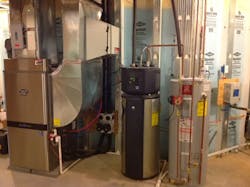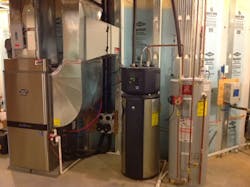Dave Weidner, Owner of Weidner Refrigeration in Diverson, Ill., has been in business since 1974. He’s been doing geothermal installations since 1995, and now is one of the go-to geothermal contractors in his area. He’s an educational director for the Refrigeration Service Engineers Society (RSES) and has written testing materials for the Geothermal Alliance of Illinois.
When it comes to adding geothermal system installation to your business, Weidner has this blunt advice: “There’s too many people out here who don’t know what they’re doing. So you’re going to have to get knowledgeable and certified.”
Weidner feels that the current state of skills in the plumbing-heating-cooling trade is as low as he’s ever seen it. “Everyone [a client] talks to should be professionals – this is a professional trade… and a bad installer can really make the technology look bad.”
Having those skills, that level of professionalism, is what will make your business stand out and attract more customers. “The best thing to do would be to get involved with Enertech or some good manufacturer,” Wiedner says, “get started, dig in and learn and really pay attention. When you make mistakes try to learn by them and keep digging.”
Going to school
Weidner also suggests going to the RSES or your local chapter of the Geothermal Alliance for specialty training, but he singles out the manufacturers of geothermal appliances in particular.
Why? Because the manufacturers are dependent upon the installers for the correct performance of the appliances they sell. The efficiencies of geothermal systems are very often operating on the thinnest margins; one small mistake in calculating, say, a heat load or refrigerant flow can mean wasted energy, higher bills, and destroy the reputation of the technology.
“We want to be that resource,” Tim Wright, Residential Sales Manager for Enertech, says. “We want to be that company that dealers, distributors and technicians can count on to learn their trade.”
Part of that is a website and training portal, geothermaluniversity.com. Any contractor from the United States or Canada can visit the site to look through all the classes on offer, a curriculum that includes not only design and installation, tech service and advanced service on the refrigerant circuit side, but also sales and marketing.
“We try to help installers, distributor and dealers get exactly what they need,” Wright says. A lot of the get-your-feet-wet training is free (as are a huge number of videos, both at geothermaluniversity.com and on the Enertech YouTube portal). At-cost training allows the student to receive educational credits and work towards various certifications.
“A number of our courses are NATE-certified,” Wright says. “We very much support that, and it adds a tremendous amount of credibility.” That training is generic across the industry – not Enertech specific or company-branded. An installer can take their certification with them wherever they want to go, to do whatever geothermal work they choose.
The company stands behind it’s training with a 100 percent satisfaction guarantee. “If they’re not satisfied with the training they receive,” Wright says, “we’ll give them a 100 percent refund, and we’ll also give them a coupon to come back and try our training again at not cost. We’re that sure they’ll walk away with what they’ve been looking for from the beginning.”
Past the federal tax-credit
In recent years, geothermal installations have been incentivized through a federal tax credit that may expire on December 31, 2016 (although a similar tax credit for solar power was recently extended by five years).
Add to that the continuing low price of natural gas, and the simple fact that geothermal has only ever been 2 to 4 percent of the heating market, and many contractors — operating with limited training budgets — are bound to ask, is it worth it to add geothermal to my business?
The answer depends largely on your clientele. While the market for geothermal is small one, it is a passionate one. “There are those people who want it because they want it,” Dave Weidner explained, and for those people, no other type of system will do.
That passion extends to a certain breed of contractor as well. “We’re used to dealing with the geothermal junkies,” Wright says, “the guys who feed off of this, love this, maybe this is all they do.” But he stresses that geothermal can be an important component of any contractor’s service offering.
“If heating and cooling contractors want to be relevant in todays market,” Wright says, “they’ve got to be able to talk about renewable energy and sustainable energy. This is a very educated buying group of consumers right now, from the Millennials all the way through to the Baby Boomers.”
Geothermal, at the end of the day, is not technically much different than installing an air-source heat pump. The geothermal loop simply takes the place of the coils. And for contractors who don’t want to deal with either the technical difficulties or capital expense of installing the loop, there are specialty loop companies to handle that side of things.
“So they will find a loop installer/provider,” Wright says, “that will not only do, say, the vertical bore and the pipe, but they typically will do the complete job, all the way to bringing the pipe into the home, to the flow center… already flushed and purged with the water and antifreeze solution, right to the unit. It’s a much easier process than it ever was before.”
Other aids to the contractor include software packages such as GeoAnalyst (www.geoanalyst.net) that allows the user to accurately size a geothermal system based on such factors as feet of pipe in the loop, heat loss calculation for the building, geothermal appliance being used and other variables.
Ultimately, only the individual p-h-c contractor can decide if adding geothermal to their business makes sense. But if it does, all the resources necessary are readily available. “I’m 70 years old,” Dave Wiedner says, “anybody can do anything they want to do, but you’ve got to have ambition… Work hard enough, you can accomplish anything.”
About the Author
Steve Spaulding
Editor-in-Chief - CONTRACTOR
Steve Spaulding is Editor-in-Chief for CONTRACTOR Magazine. He has been with the magazine since 1996, and has contributed to Radiant Living, NATE Magazine, and other Endeavor Media properties.

